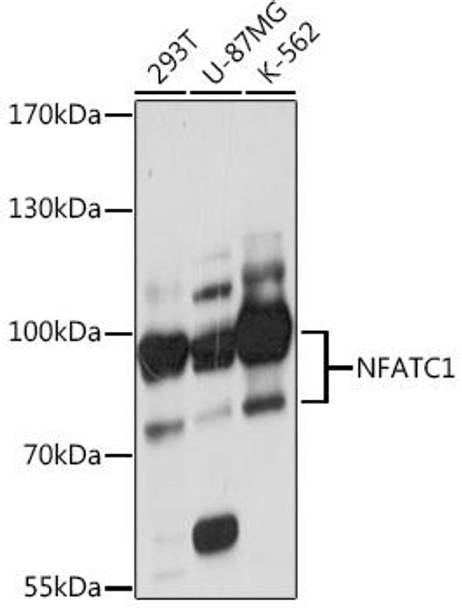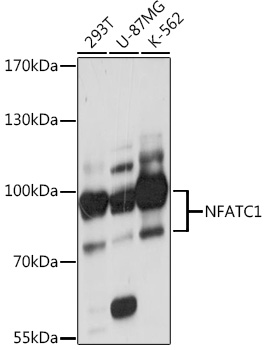Anti-NFATC1 Antibody (CAB16928)
- SKU:
- CAB16928
- Product type:
- Antibody
- Reactivity:
- Human
- Host Species:
- Rabbit
- Isotype:
- IgG
- Antibody Type:
- Polyclonal Antibody
- Research Area:
- Epigenetics and Nuclear Signaling
Description
| Antibody Name: | Anti-NFATC1 Antibody |
| Antibody SKU: | CAB16928 |
| Antibody Size: | 20uL, 50uL, 100uL |
| Application: | WB IHC |
| Reactivity: | Human |
| Host Species: | Rabbit |
| Immunogen: | Recombinant protein of human NFATC1. |
| Application: | WB IHC |
| Recommended Dilution: | WB 1:500 - 1:2000 IHC 1:50 - 1:200 |
| Reactivity: | Human |
| Positive Samples: | 293T, U-87MG, K-562 |
| Immunogen: | Recombinant protein of human NFATC1. |
| Purification Method: | Affinity purification |
| Storage Buffer: | Store at -20°C. Avoid freeze / thaw cycles. Buffer: PBS with 0.02% sodium azide, 50% glycerol, pH7.3. |
| Isotype: | IgG |
| Sequence: | Email for sequence |
| Gene ID: | 4772 |
| Uniprot: | O95644 |
| Cellular Location: | Cytoplasm, Nucleus |
| Calculated MW: | 38kDa/74- 88kDa/100-101kDa |
| Observed MW: | 75-100kDa |
| Synonyms: | NF-ATC, NF-ATc1.2, NFAT2, NFATc, NFATC1 |
| Background: | The product of this gene is a component of the nuclear factor of activated T cells DNA-binding transcription complex. This complex consists of at least two components: a preexisting cytosolic component that translocates to the nucleus upon T cell receptor (TCR) stimulation, and an inducible nuclear component. Proteins belonging to this family of transcription factors play a central role in inducible gene transcription during immune response. The product of this gene is an inducible nuclear component. It functions as a major molecular target for the immunosuppressive drugs such as cyclosporin A. Multiple alternatively spliced transcript variants encoding distinct isoforms have been identified for this gene. Different isoforms of this protein may regulate inducible expression of different cytokine genes. |
| UniProt Protein Function: | NFAT2: a transcription factor that plays a role in the inducible expression of cytokine genes in T cells, especially in the induction of the IL-2 and IL-4. Also control gene expression in embryonic cardiac cells. Could regulate not only the activation and proliferation but also the differentiation and programmed death of lymphoid and nonlymphoid cells. Six splice variant isoforms have been identified. Expressed in thymus, peripheral leukocytes as T-cells and spleen. Isoforms A are preferentially expressed in effector T-cells (thymus and peripheral leukocytes) whereas isoforms B and isoforms C are preferentially expressed in naive T-cells (spleen). Isoforms B are expressed in naive T-cells after first antigen exposure and isoforms A are expressed in effector T-cells after second antigen exposure. |
| UniProt Protein Details: | Protein type:DNA-binding; Transcription factor Chromosomal Location of Human Ortholog: 18q23 Cellular Component: nucleoplasm; transcription factor complex; nuclear chromatin; cytoplasm; cytosol; nucleus Molecular Function:RNA polymerase II transcription factor activity, enhancer binding; protein binding; mitogen-activated protein kinase p38 binding; FK506 binding; transcription factor activity Biological Process: transcription from RNA polymerase II promoter; positive regulation of transcription, DNA-dependent; calcium ion transport; heart development; innate immune response; epithelial to mesenchymal transition; positive regulation of transcription from RNA polymerase II promoter; osteoclast differentiation; G1/S transition of mitotic cell cycle |
| NCBI Summary: | The product of this gene is a component of the nuclear factor of activated T cells DNA-binding transcription complex. This complex consists of at least two components: a preexisting cytosolic component that translocates to the nucleus upon T cell receptor (TCR) stimulation, and an inducible nuclear component. Proteins belonging to this family of transcription factors play a central role in inducible gene transcription during immune response. The product of this gene is an inducible nuclear component. It functions as a major molecular target for the immunosuppressive drugs such as cyclosporin A. Multiple alternatively spliced transcript variants encoding distinct isoforms have been identified for this gene. Different isoforms of this protein may regulate inducible expression of different cytokine genes. [provided by RefSeq, Jul 2013] |
| UniProt Code: | O95644 |
| NCBI GenInfo Identifier: | 8928220 |
| NCBI Gene ID: | 4772 |
| NCBI Accession: | O95644.3 |
| UniProt Secondary Accession: | O95644,Q12865, Q15793, Q2M1S3, B5B2M4, B5B2M5, B5B2M6 B5B2M7, B5B2M8, B5B2M9, B5B2N1, |
| UniProt Related Accession: | O95644 |
| Molecular Weight: | |
| NCBI Full Name: | Nuclear factor of activated T-cells, cytoplasmic 1 |
| NCBI Synonym Full Names: | nuclear factor of activated T-cells, cytoplasmic, calcineurin-dependent 1 |
| NCBI Official Symbol: | NFATC1 |
| NCBI Official Synonym Symbols: | NFAT2; NFATc; NF-ATC |
| NCBI Protein Information: | nuclear factor of activated T-cells, cytoplasmic 1; NFAT transcription complex cytosolic component |
| UniProt Protein Name: | Nuclear factor of activated T-cells, cytoplasmic 1 |
| UniProt Synonym Protein Names: | NFAT transcription complex cytosolic component; NF-ATc; NFATc |
| UniProt Gene Name: | NFATC1 |
| UniProt Entry Name: | NFAC1_HUMAN |







